Vegetable Juices
Six Tips for Perfect Homemade Vegetable Juices

Searching for methods to create tasty and healthy vegetable juices at home? Search no more! We have everything you need with six professional tips to assist you in reaching perfection.
From selecting the right vegetables to enhancing flavors with herbs and spices, we’ll guide you every step of the way.
So grab your juicer and get ready to enjoy the satisfying taste of homemade vegetable juices that will nourish your body and delight your taste buds. Let’s get started!
Key Takeaways
- Select fresh, organic vegetables for higher nutrient content
- Use slow juicers or cold-pressed juicers for maximum nutrient retention
- Add herbs and spices to enhance the flavor of homemade vegetable juices
- Store homemade vegetable juices in airtight containers and consume within a few days for maximum freshness and nutritional benefits
Selecting the Right Vegetables
We can select the right vegetables for our homemade vegetable juices by considering their quality and nutritional value. When it comes to homemade vegetable juices, the nutritional benefits are immense. Vegetables are packed with essential vitamins, minerals, and antioxidants that can contribute to overall health and well-being.
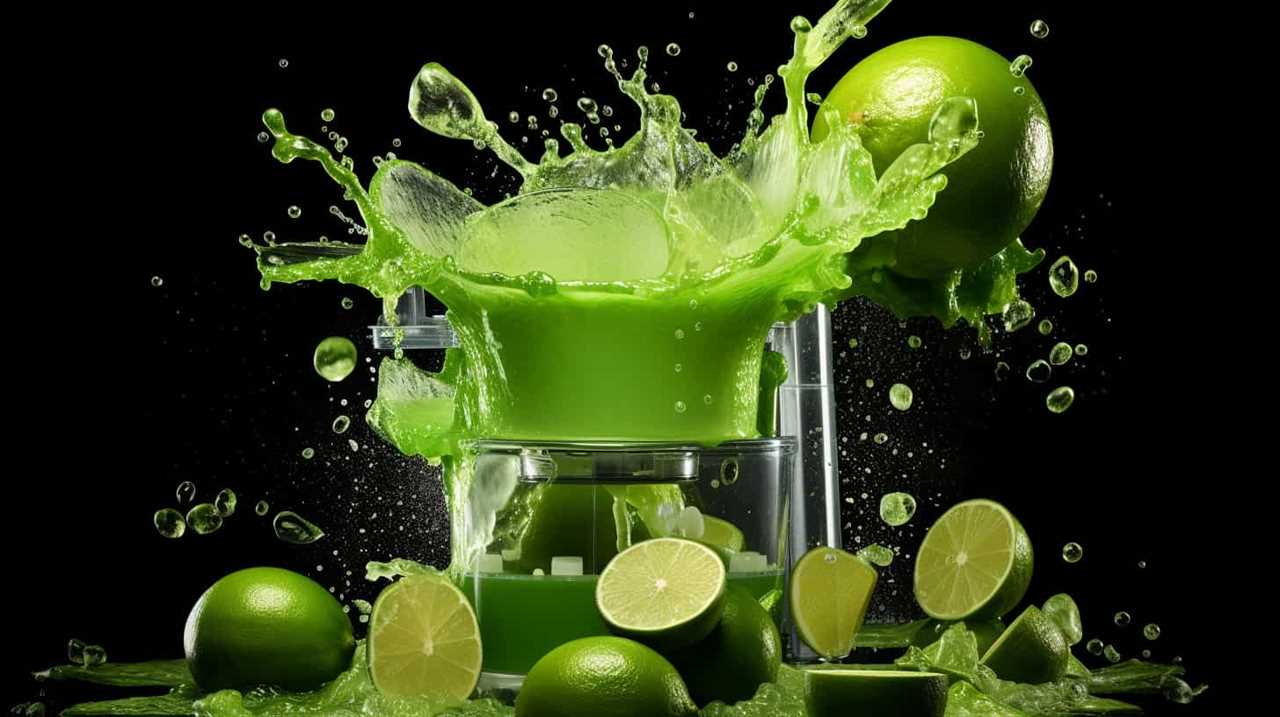
To maximize the nutrient extraction from these vegetables, it’s important to employ effective juicing techniques. Firstly, opt for fresh, organic vegetables as they tend to have higher nutrient content. Secondly, consider a variety of vegetables to ensure a diverse range of nutrients in your juice.
Lastly, be mindful of the juicing process itself. Slow juicers or cold-pressed juicers are recommended as they retain more nutrients than high-speed centrifugal juicers. By following these tips, we can create homemade vegetable juices that aren’t only delicious but also packed with vital nutrients.
Preparing the Vegetables for Juicing
To ensure optimal nutrient extraction, proper preparation of the vegetables is essential. Here are some tips to help you prepare the vegetables for juicing:
- Wash the vegetables thoroughly to remove any dirt or pesticides. This will ensure that you’re getting the full nutritional value of the vegetables.
- Peel the vegetables if necessary. Some vegetables, like carrots or cucumbers, may need to be peeled before juicing.
- Cut the vegetables into small pieces. This will make it easier for the juicer to extract the juice and prevent any clogging.
- Remove any seeds or pits from the vegetables. These can affect the taste and texture of the juice.
- Store the prepared vegetables in the refrigerator until you’re ready to juice them. This will help preserve their freshness and nutritional value.
Enhancing Flavor With Herbs and Spices
Enhance the flavor of your homemade vegetable juices with the addition of herbs and spices.

Adding herbs and spices to your vegetable juice not only enhances the taste but also provides numerous health benefits.
Get creative with your herb and spice combinations to create unique flavors that will wow your taste buds.
Fresh herbs like basil, mint, and cilantro can add a refreshing and aromatic twist to your juice.
Spices like ginger, turmeric, and cayenne pepper can add a spicy kick and boost your immune system.

The benefits of using fresh herbs and spices in your vegetable juice include anti-inflammatory properties, improved digestion, and increased antioxidant intake.
Choosing the Right Juicing Method
When choosing the right juicing method, it’s important to consider the efficiency and effectiveness of the different options available. Here are a few key points to keep in mind:
- Centrifugal juicers: These are the most common type of juicer and work by rapidly spinning the produce to extract the juice. They’re fast and convenient but may produce less nutritious juice due to the heat generated during the process.
- Masticating juicers: Also known as cold press or slow juicers, these machines use a slow grinding and squeezing action to extract juice. They’re more efficient at extracting nutrients and enzymes, resulting in a higher quality juice.
- Hydraulic press juicers: These juicers use a hydraulic press to extract juice from produce. They’re known for producing the highest quality juice with minimal oxidation, but they can be expensive and time-consuming to use.
- Twin gear juicers: These juicers have two gears that crush the produce and extract juice. They’re highly efficient at extracting juice and retaining nutrients, but they can be more difficult to clean and operate.
- Cold pressed juice: Cold pressed juice refers to juice that’s extracted using a masticating juicer or hydraulic press. The low heat and slow extraction process helps to preserve the nutrients and enzymes in the juice, resulting in a more nutrient-dense beverage.
Considering the different juicer types and the benefits of cold pressed juice can help you choose the right juicing method that suits your needs and preferences.
Storing and Enjoying Your Homemade Vegetable Juices
We love storing and enjoying our homemade vegetable juices. To ensure the freshness and nutritional benefits of your juices, here are some storing tips to keep in mind.
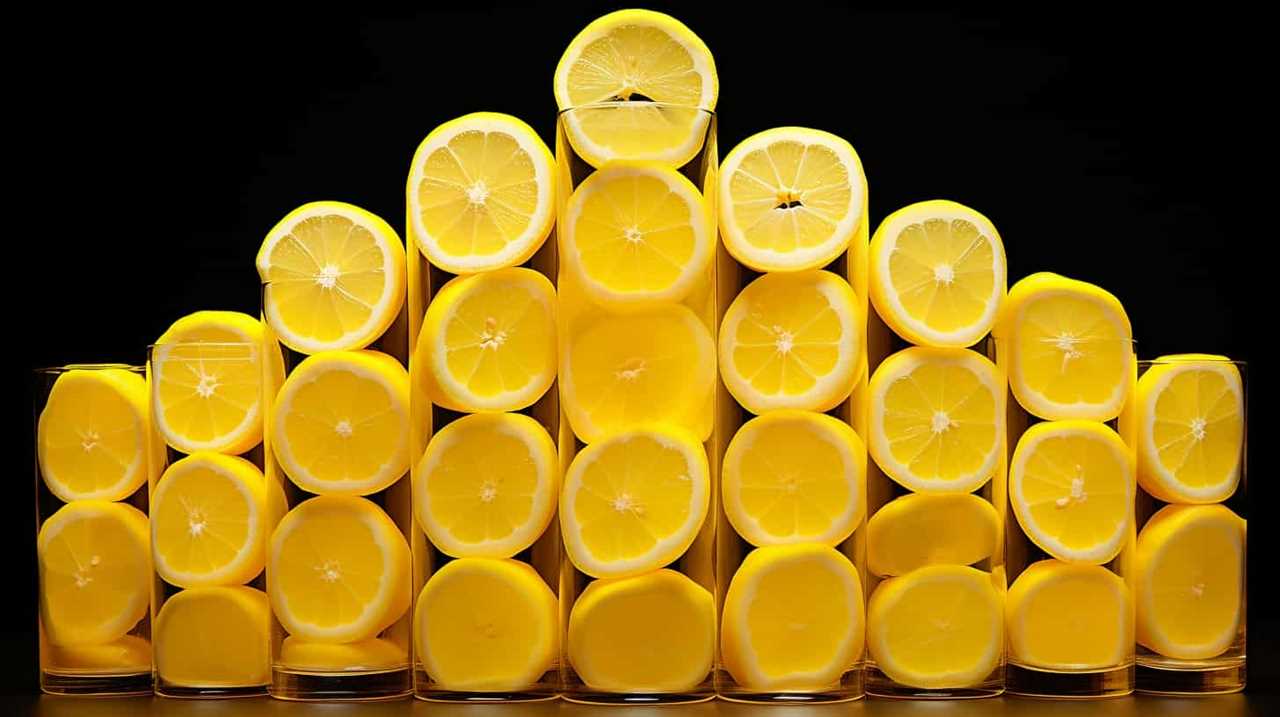
First, it’s important to store your juices in airtight containers to prevent oxidation and maintain their vibrant colors. Glass jars with tight-fitting lids work best.
Secondly, refrigerate your juices immediately after juicing to slow down the degradation of nutrients. This will also help preserve the flavors. Remember to consume your juices within 24-48 hours to maximize their nutritional value.
Lastly, if you want to prepare juices in advance, consider freezing them in ice cube trays for future use. This will help retain the vitamins and minerals.
Frequently Asked Questions
Can I Use Canned Vegetables for Juicing Instead of Fresh Ones?
Using canned vegetables for juicing has pros and cons. While it may be convenient, fresh produce generally offers more nutrients and better taste. Consider using fresh vegetables to maximize the health benefits of your homemade vegetable juices.

How Long Should I Let the Vegetables Soak Before Juicing Them?
Before juicing vegetables, it’s important to let them soak for about 10 minutes to enhance their juiciness. This is one of the preparation techniques we recommend for the best vegetables for juicing.
Should I Peel the Vegetables Before Juicing Them?
Peeling vegetables before juicing can enhance the taste and texture of the juice. However, keeping the peel can provide added nutrients and fiber. It ultimately depends on personal preference and the type of vegetable being used.
Can I Mix Fruits With the Vegetables for a Sweeter Taste?
Yes, you can mix fruits with vegetables for a sweeter taste in your homemade vegetable juices. It not only adds natural sweetness but also provides a variety of nutrients. Additionally, adding herbs can enhance the flavor and health benefits of your vegetable juices.
Can I Freeze the Vegetable Juice for Later Use?
Yes, you can freeze vegetable juice for later use. Freezing preserves the nutrients and flavors of the juice. It’s a convenient way to have homemade vegetable juice on hand whenever you need it.
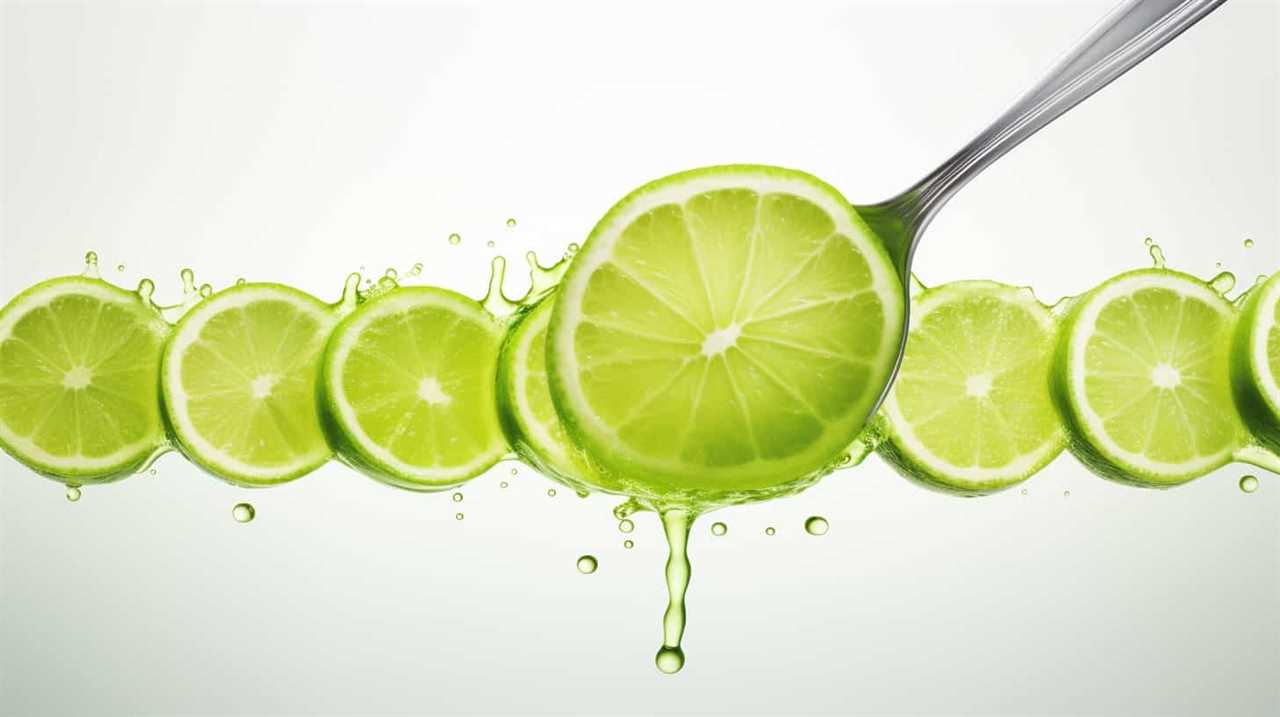
Conclusion
Incorporating homemade vegetable juices into your diet is a great way to boost your health and enjoy delicious flavors.
By following these six tips, you can create the perfect vegetable juices every time.
Remember, selecting the right vegetables, preparing them properly, and adding herbs and spices will enhance the flavor.
Choose the juicing method that suits your needs, and don’t forget to store your juices properly for maximum freshness.

So grab your juicer and start exploring the endless possibilities of homemade vegetable juices!
Susannah expertise lies in researching and compiling evidence-based content on juicing, nutrition, and overall health. She is committed to ensuring that The Juicery World offers accurate, up-to-date, and trustworthy information to empower readers to take control of their health. Susannah’s goal is to inspire individuals to embrace juicing as a way to nourish their bodies and live their best lives.
Vegetable Juices
What Are the Health Benefits of Vegetable Juices?

- Nutritional differences between whole vegetables and vegetable juices.
- Factors to consider when incorporating vegetable juices into a balanced diet
As we enjoy the rich flavors of nature’s goodness in vegetable juices, our bodies are nourished with a plethora of health benefits to celebrate.
These nutrient-packed concoctions act as a fortress, fortifying our immune systems and guarding against illness.
They work tirelessly to nourish our digestive systems, promoting optimal function and gut health.
With each sip, the detoxification process is enhanced, purging toxins and rejuvenating our cells.

Join us on this journey as we explore the myriad ways vegetable juices support our hearts, skin, and hair.
Key Takeaways
- Vegetable juices boost the immune system and provide energy.
- Vegetable juices promote digestive health and weight loss.
- Vegetable juices enhance detoxification and liver health.
- Vegetable juices support heart health and blood pressure.
Boosts Immune System
One of the key benefits of vegetable juices is that they enhance our immune system. Vegetable juices are packed with essential nutrients, such as vitamins A, C, and E, which are known to support our immune system. These vitamins act as antioxidants, helping to protect our cells from damage and strengthening our immune response. Additionally, vegetable juices contain phytochemicals, which are natural compounds that have been shown to have immune-boosting properties. These compounds help to increase the production of white blood cells, which are crucial for fighting off infections and diseases.
By regularly consuming vegetable juices, we can provide our bodies with the immune system support they need to stay healthy and ward off illnesses.
Not only do vegetable juices enhance our immune system, but they also provide a natural energy boost. The nutrients in vegetable juices, such as B vitamins and iron, help to increase our energy levels and combat fatigue. Furthermore, vegetable juices are a great source of hydration, which is essential for maintaining optimal energy levels throughout the day.

Promotes Digestive Health
To promote digestive health, vegetable juices can be beneficial when consumed regularly.
Vegetable juices are rich in fiber, which improves gut function by aiding in digestion and preventing constipation. The high fiber content in vegetable juices helps to promote regular bowel movements and maintain a healthy digestive system.
Additionally, vegetable juices are low in calories and can aid in weight loss. By replacing sugary beverages with vegetable juices, individuals can reduce their calorie intake while still obtaining essential nutrients and vitamins.
Furthermore, vegetable juices contain antioxidants and phytochemicals that help to reduce inflammation in the gut and promote a healthy gut microbiome.

Enhances Detoxification
Vegetable juices enhance detoxification by supporting the liver’s natural cleansing processes. When we consume vegetable juices, we provide our bodies with essential nutrients that improve liver function, allowing it to efficiently remove toxins from our system.
Here are some ways in which vegetable juices aid in detoxification:
- Increased hydration: Vegetable juices are rich in water content, helping to flush out toxins and hydrate the body.
- Antioxidant power: Vegetables like kale, spinach, and carrots are packed with antioxidants that protect the liver from damage caused by harmful substances.
- Fiber boost: Juicing vegetables retains their fiber content, which aids digestion and promotes regular bowel movements, preventing toxin buildup.
- Weight loss support: Vegetable juices are low in calories and high in nutrients, making them an excellent addition to a weight loss diet. Shedding excess pounds can also reduce the burden on the liver, allowing it to function optimally.
Incorporating vegetable juices into our diets can be a simple and effective way to enhance detoxification and support overall health.
Supports Heart Health
As we continue exploring the health benefits of vegetable juices, it’s important to highlight their role in supporting heart health. Consuming vegetable juices can contribute to cardiovascular health and help maintain healthy blood pressure levels. Many vegetables, such as beets and leafy greens, are rich in nitrates, which have been shown to have a positive impact on heart health. Nitrates are converted into nitric oxide in the body, which helps relax and widen blood vessels, improving blood flow and reducing blood pressure.

Additionally, vegetable juices are packed with antioxidants and phytochemicals that can reduce inflammation and oxidative stress, both of which are risk factors for heart disease. By incorporating vegetable juices into our diet, we can potentially protect and support the health of our heart.
Transitioning to the next section, let’s now explore how vegetable juices can improve skin and hair health.
Improves Skin and Hair Health
Continuing our exploration of the health benefits of vegetable juices, we can now delve into how they improve the health of our skin and hair.
Here are some ways that vegetable juices can help with hair growth and skin rejuvenation:

- Hydration: Vegetable juices are rich in water content, which helps to keep our skin hydrated and prevents dryness and flakiness.
- Nutrient boost: Vegetables like carrots, spinach, and kale are packed with vitamins and minerals that are essential for healthy hair and skin. These nutrients nourish the cells and promote hair growth and a glowing complexion.
- Antioxidant power: Vegetables contain antioxidants that protect our skin and hair from damage caused by free radicals. This helps to reduce signs of aging and keeps our skin and hair looking youthful.
- Detoxification: Vegetable juices aid in the detoxification process, helping to remove toxins from our body that can affect our skin and hair health.
Frequently Asked Questions
Can Vegetable Juices Help With Weight Loss?
Yes, vegetable juices can aid in weight loss. Through juicing techniques, they provide essential nutrients while being low in calories. Additionally, juicing for detoxification can help eliminate toxins and support overall health.
Are There Any Specific Vegetables That Are Better for Juicing Than Others?
There are specific vegetables that are better for juicing than others, such as spinach, kale, and celery. Incorporating these into your juicing recipes can provide numerous health benefits. They are great for beginners looking to start a healthy juicing routine.
How Often Should I Drink Vegetable Juices to Experience Their Health Benefits?
To experience the health benefits of vegetable juices, we should incorporate them into our daily routine. It’s important to drink them regularly, but the frequency may vary depending on individual needs and preferences.
Can Vegetable Juices Be Used as a Substitute for Whole Vegetables in a Balanced Diet?
Vegetable juices can be a convenient way to incorporate nutrients into a balanced diet. However, it’s important to consider the nutritional differences between whole vegetables and juices, and to ensure variety and moderation in consumption.

Are There Any Potential Side Effects or Risks Associated With Consuming Vegetable Juices Regularly?
There may be potential risks associated with consuming vegetable juices regularly, such as digestive issues or nutrient imbalances. However, these can be minimized by ensuring variety, moderation, and consulting with a healthcare professional.
Conclusion
In conclusion, vegetable juices offer a plethora of health benefits.
Just like a powerful superhero, they boost our immune system, promote digestive health, enhance detoxification, support heart health, and improve skin and hair health.
By incorporating vegetable juices into our daily routine, we can harness the superpowers of these nutrient-packed drinks and embark on a journey towards a healthier and happier life.
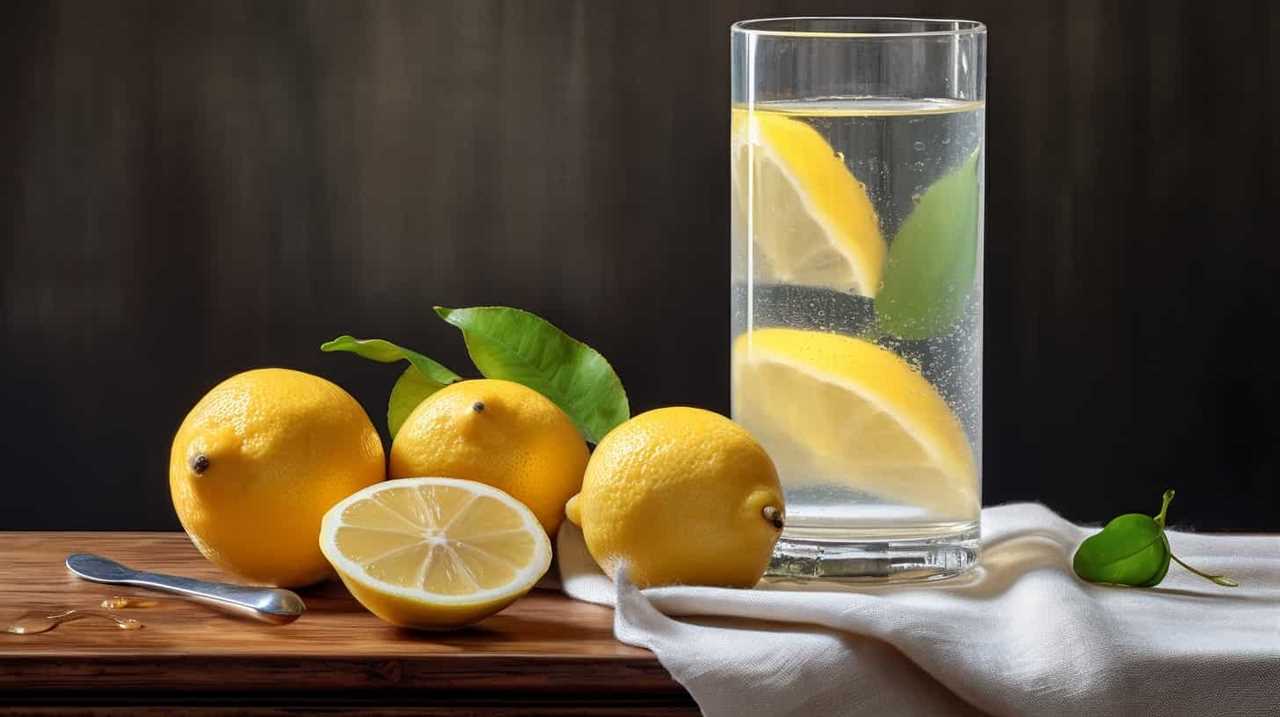
So, let’s raise our glasses and toast to the incredible health benefits of vegetable juices!
Susannah expertise lies in researching and compiling evidence-based content on juicing, nutrition, and overall health. She is committed to ensuring that The Juicery World offers accurate, up-to-date, and trustworthy information to empower readers to take control of their health. Susannah’s goal is to inspire individuals to embrace juicing as a way to nourish their bodies and live their best lives.
Vegetable Juices
What Are the Health Benefits of Cold-Pressed Vegetable Juice?

We all desire to feel our best and maintain good health, correct? Did you know that cold-pressed vegetable juice can have a significant impact on our well-being? It’s a fact!
In fact, studies have shown that drinking this nutrient-packed juice can boost our immunity, support digestion, enhance detoxification, promote heart health, and even improve our skin’s radiance.
So, if you’re looking to serve your body some serious goodness, keep reading to discover the incredible health benefits of cold-pressed vegetable juice.
Key Takeaways
- Cold-pressed vegetable juice supports immune system function by enhancing the production of white blood cells and reducing inflammation.
- It positively impacts the gut microbiome, aids in digestion, and ensures maximum nutrient absorption.
- Regular consumption of cold-pressed vegetable juice helps lower blood pressure and cholesterol levels, promoting cardiovascular health.
- It enhances skin health and radiance by promoting collagen production, protecting the skin from free radicals, and improving hydration.
Boosts Immunity
Boosting immunity is one of the key benefits that cold-pressed vegetable juice provides for us. Our immune system plays a crucial role in protecting our bodies from infections and diseases. Cold-pressed vegetable juices are rich in vitamins, minerals, and antioxidants that support immune system function. These nutrients help to strengthen our immune response by enhancing the production of white blood cells, which are responsible for fighting off harmful pathogens.

Additionally, cold-pressed vegetable juice can help reduce inflammation in the body, which can further support immune function. To maximize the immune-boosting benefits of cold-pressed vegetable juice, it’s important to choose recipes that incorporate immune-boosting ingredients such as spinach, kale, ginger, turmeric, and citrus fruits. By regularly consuming cold-pressed vegetable juices, we can give our immune system the support it needs to stay strong and healthy.
Supports Digestive Health
To continue our exploration of the health benefits of cold-pressed vegetable juice, let us now delve into how it supports digestive health. Consuming cold-pressed vegetable juice can have a positive impact on our gut microbiome and nutrient absorption.
The gut microbiome is a complex community of microorganisms that reside in our digestive tract. These microorganisms play a crucial role in maintaining digestive health and overall well-being. Cold-pressed vegetable juice contains a plethora of vitamins, minerals, and antioxidants that can nourish and support the growth of beneficial bacteria in the gut. By promoting a healthy balance of gut bacteria, cold-pressed vegetable juice can aid in digestion and reduce the risk of digestive disorders.
Furthermore, the nutrients present in cold-pressed vegetable juice are easily absorbed by the body. The juicing process breaks down the cell walls of vegetables, making it easier for the body to access and absorb the essential nutrients. This can enhance nutrient absorption and ensure that our bodies receive the maximum benefits from the vegetables we consume.
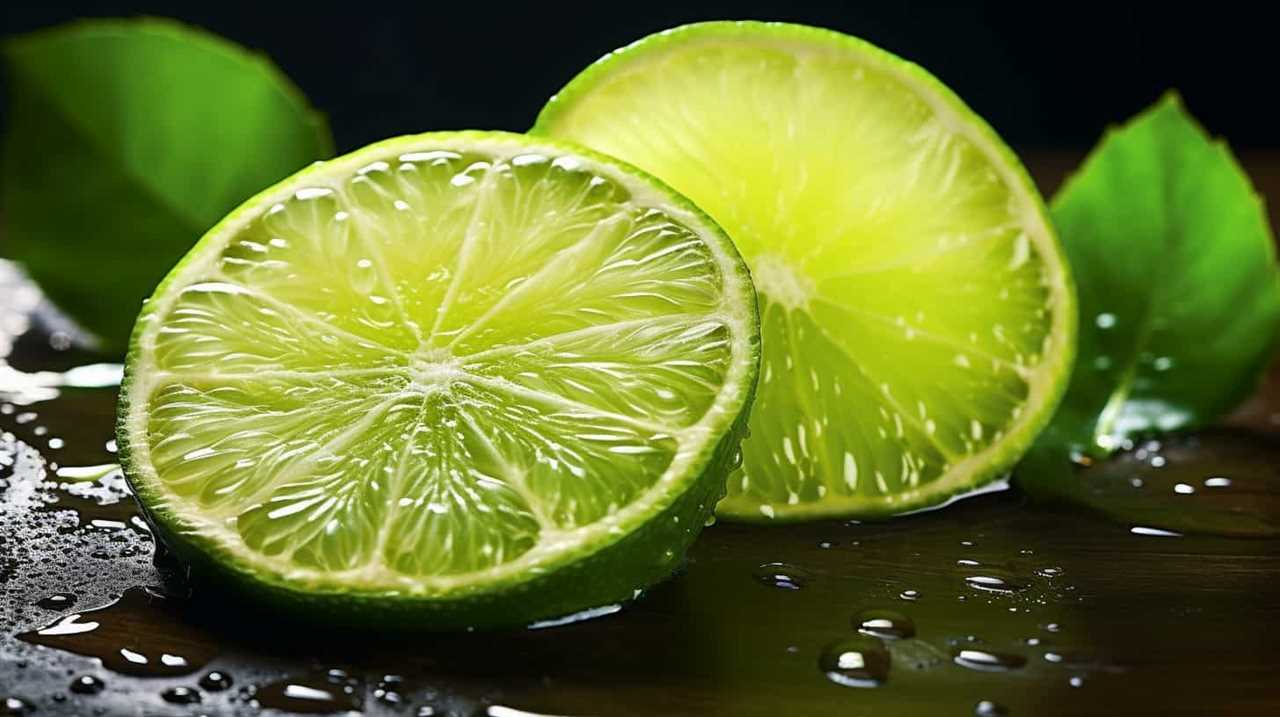
In summary, consuming cold-pressed vegetable juice can support digestive health by promoting a healthy gut microbiome and enhancing nutrient absorption. By incorporating this nutrient-rich beverage into our diet, we can nourish our bodies from within and support overall digestive well-being.
| Benefits of Cold-Pressed Vegetable Juice for Digestive Health |
|---|
| Supports a healthy gut microbiome |
| Enhances nutrient absorption |
| Aids in digestion |
Note: The above table is for illustrative purposes only and does not represent actual data.
Enhances Detoxification
Cold-pressed vegetable juice promotes heart health by providing essential nutrients that support cardiovascular function. The juice is packed with vitamins, minerals, and antioxidants that help reduce inflammation and oxidative stress, which are risk factors for heart disease. Regular consumption of cold-pressed vegetable juice can help lower blood pressure and cholesterol levels, leading to improved heart health. Furthermore, the juice is a good source of dietary nitrates, which have been shown to enhance blood flow and improve endothelial function. These cardiovascular benefits make cold-pressed vegetable juice a valuable addition to a heart-healthy diet.
Transition: In addition to its detoxifying and heart-healthy properties, cold-pressed vegetable juice also boosts immune function.
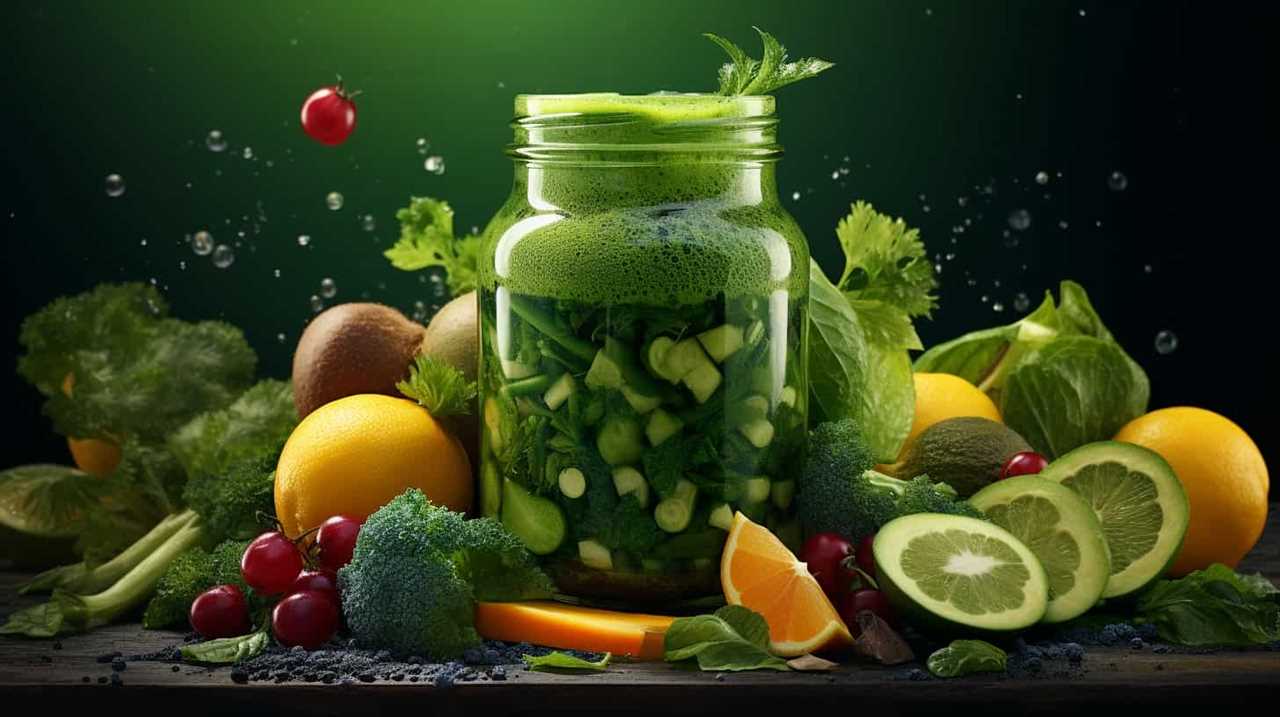
Promotes Heart Health
To promote heart health, we need to regularly consume cold-pressed vegetable juice. This nutrient-rich juice offers several benefits for heart disease prevention and overall cardiovascular health. Here are three reasons why incorporating cold-pressed vegetable juice into your diet can be beneficial:
- Reduces inflammation: Cold-pressed vegetable juice contains antioxidants and anti-inflammatory compounds that help reduce inflammation in the body. Chronic inflammation is linked to an increased risk of heart disease.
- Lowers blood pressure: Vegetables like celery, beets, and spinach, commonly found in cold-pressed vegetable juice, have been shown to naturally lower blood pressure. By incorporating these vegetables into your diet, you can help maintain healthy blood pressure levels.
- Improves cholesterol levels: Cold-pressed vegetable juice is rich in soluble fiber, which can help lower LDL cholesterol levels. By reducing LDL cholesterol, you can decrease your risk of heart disease.
Incorporating cold-pressed vegetable juice into your daily routine is a delicious and convenient way to support heart health and promote overall cardiovascular well-being.
Improves Skin Radiance
Incorporating cold-pressed vegetable juice into our daily routine can enhance the radiance of our skin. Cold-pressed vegetable juices, such as carrot and beet juice, are packed with essential vitamins and antioxidants that promote skin health. These juices are rich in nutrients like vitamin C and beta-carotene, which can help improve skin hydration and reduce the signs of aging.
Vitamin C is known for its ability to promote collagen production, which can help improve skin elasticity and firmness. Additionally, the antioxidants found in cold-pressed vegetable juices can help protect the skin from free radicals and environmental damage.
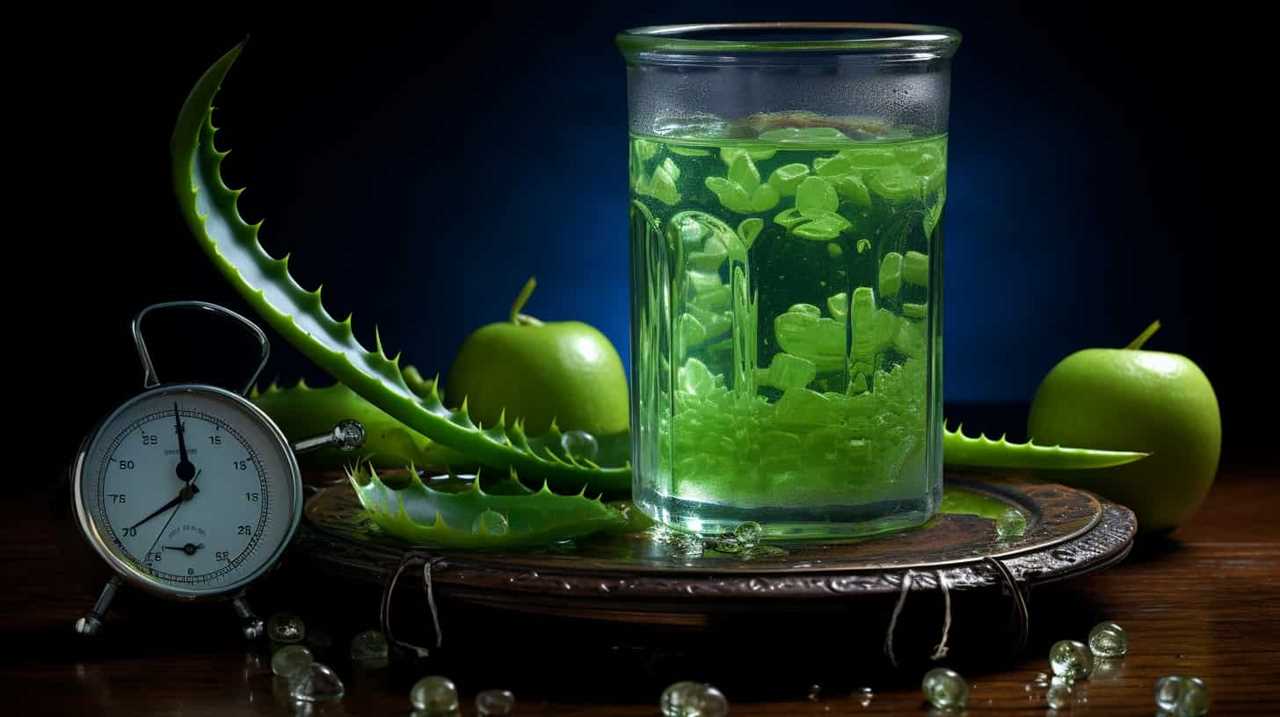
Frequently Asked Questions
Can Cold-Pressed Vegetable Juice Be Consumed by Individuals With Certain Dietary Restrictions or Allergies?
Yes, cold-pressed vegetable juice can be consumed by individuals with certain dietary restrictions or allergies. It provides a nutritious option for those with specific needs, as it is free from common allergens and can be customized to fit various dietary restrictions.
Is There a Specific Time of Day That Is Recommended for Consuming Cold-Pressed Vegetable Juice?
Recommended timing for consuming cold-pressed vegetable juice is in the morning or before meals to maximize digestion benefits. It aids in nutrient absorption and provides a natural energy boost.
How Long Does the Nutrient Content of Cold-Pressed Vegetable Juice Remain Stable After It Is Made?
After making cold-pressed vegetable juice, the nutrient content remains stable for a limited time. However, over a longer period, nutrient degradation may occur. It’s important to consume the juice as soon as possible to maximize its health benefits.
Are There Any Potential Side Effects or Precautions to Consider Before Incorporating Cold-Pressed Vegetable Juice Into One’s Diet?
Before incorporating cold-pressed vegetable juice into our diet, it’s important to consider potential side effects and take necessary precautions. It’s always wise to consult with a healthcare professional to ensure it aligns with our individual health needs.

Can Cold-Pressed Vegetable Juice Be Used as a Meal Replacement or Is It More Suitable as a Supplement to a Balanced Diet?
Cold-pressed vegetable juice can serve as both a meal replacement and a supplement to a balanced diet. It offers benefits such as providing essential nutrients, supporting digestion, and aiding in weight management.
Conclusion
In conclusion, cold-pressed vegetable juice offers numerous health benefits, making it a valuable addition to your diet.
One interesting statistic to consider is that studies have shown that consuming just one serving of cold-pressed vegetable juice per day can increase your daily intake of vitamins and minerals by up to 40%.
This remarkable boost in nutritional value can have a significant impact on your overall health and well-being, leaving you feeling energized and nourished.

Susannah expertise lies in researching and compiling evidence-based content on juicing, nutrition, and overall health. She is committed to ensuring that The Juicery World offers accurate, up-to-date, and trustworthy information to empower readers to take control of their health. Susannah’s goal is to inspire individuals to embrace juicing as a way to nourish their bodies and live their best lives.
Vegetable Juices
Why Should You Learn to Craft Vegetable Juices?

We absolutely must learn to craft vegetable juices! These nutrient-packed concoctions are a game-changer for our health and well-being. They offer a multitude of benefits, from boosting our immune system to aiding in weight loss and detoxification.
Plus, they are easy to make and won’t break the bank. Say goodbye to energy slumps and hello to vitality with the power of vegetable juices.
Let’s dive into the world of juicing and reap the rewards together!
Key Takeaways
- Vegetable juices are packed with essential nutrients, vitamins, and minerals.
- They offer a high nutritional value, providing a concentrated dose of vitamins A, C, and K, as well as minerals like potassium and magnesium.
- Vegetable juices aid in digestion and help break down food due to the enzymes they contain.
- Regular consumption of vegetable juices can support weight loss, detoxification, and enhance energy and vitality.
Health Benefits of Vegetable Juices
We have found that consuming vegetable juices regularly can greatly improve our overall health and well-being. Vegetable juices are packed with essential nutrients, vitamins, and minerals that are vital for our body’s optimal functioning. They offer a high nutritional value, providing us with a concentrated dose of vitamins A, C, and K, as well as minerals like potassium and magnesium. These nutrients help boost our immune system, promote healthy skin, and support various bodily functions.

Moreover, vegetable juices can aid in improving digestion. They contain enzymes that assist in breaking down food, making it easier for our body to absorb nutrients and eliminate waste. The fiber content in vegetable juices also helps regulate bowel movements and promote a healthy gut.
Easy and Affordable Vegetable Juice Recipes
Let’s explore some simple and budget-friendly recipes for crafting vegetable juices. Here are three quick and refreshing vegetable juice blends that you can easily incorporate into your daily routine:
- Green Detox Juice: Combine a handful of spinach, one cucumber, two celery stalks, one green apple, and a squeeze of lemon juice. This blend is packed with antioxidants and nutrients that can help detoxify your body.
- Carrot-Orange Energizer: Juice four carrots, two oranges, and a small piece of ginger. This vibrant blend is rich in vitamin C and beta-carotene, providing a natural energy boost to start your day.
- Beet-Berry Blast: Juice one medium-sized beet, a handful of mixed berries, and a small piece of ginger. This colorful concoction is loaded with antioxidants and can support heart health.
These recipes offer creative ways to incorporate vegetable juices into your daily routine, providing a delicious and nutritious alternative to store-bought options.
Enjoy the benefits of homemade vegetable juices with these easy and affordable recipes!
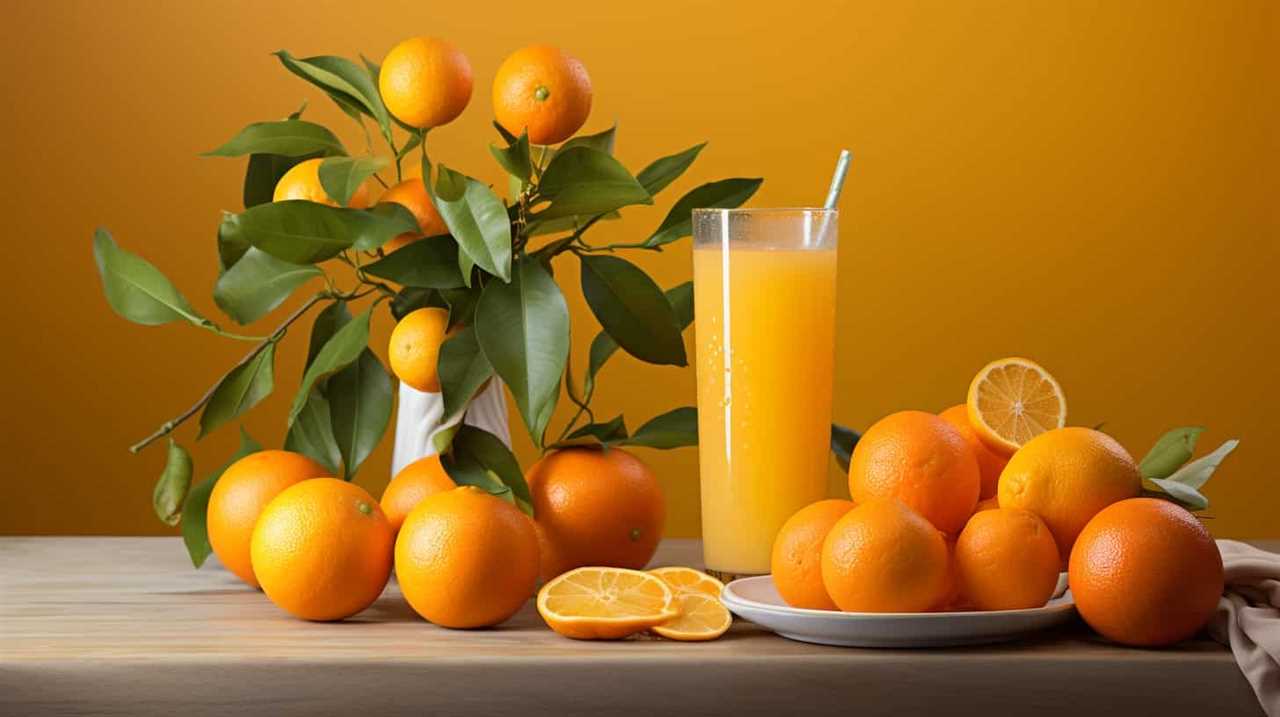
Boosting Immunity With Vegetable Juices
Crafting vegetable juices can boost our immunity and enhance our overall health. Vegetable juices are packed with essential nutrients that can help strengthen our immune system. These juices are rich in vitamins, minerals, and antioxidants, which play a crucial role in supporting our body’s defense mechanisms.
For example, carrots are high in vitamin A, which helps maintain the integrity of our skin and mucosal cells, preventing pathogens from entering our body. Leafy greens like spinach and kale are excellent sources of vitamin C, which is known to boost immune function.
Additionally, vegetable juices are also beneficial for improving digestion. They contain fiber, which aids in regulating bowel movements and promoting a healthy gut. The enzymes present in these juices can also help break down food and increase nutrient absorption.
Weight Loss and Detoxification With Vegetable Juices
Vegetable juices can play a significant role in promoting weight loss and detoxification. Here are three reasons why incorporating vegetable juices into your diet can be beneficial for achieving these goals:
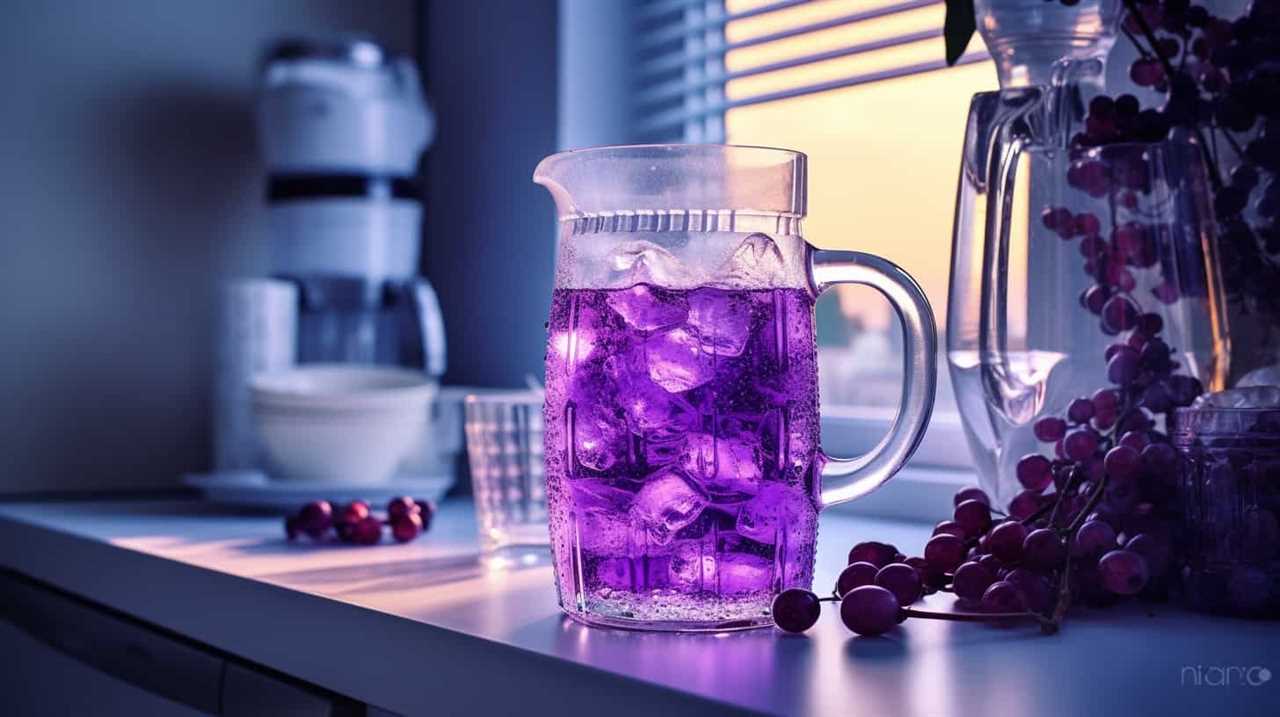
- Weight Loss: Vegetable juices are low in calories and high in nutrients, making them an excellent choice for weight loss. They provide a feeling of fullness while supplying essential vitamins and minerals. By replacing high-calorie snacks or meals with vegetable juices, you can reduce your overall calorie intake and support weight loss.
- Detoxification: Vegetable juices are packed with antioxidants and phytonutrients that help remove toxins from the body. They support liver function, which is crucial for detoxification. Regular consumption of vegetable juices can aid in flushing out waste products, promoting a healthier body and clearer skin.
- Digestion Improvement: Many vegetables contain dietary fiber, which is essential for maintaining a healthy digestive system. Juicing vegetables can help break down fiber, making it easier for the body to absorb nutrients and improve digestion. This can lead to reduced bloating, increased regularity, and improved overall digestive health.
Incorporating vegetable juices into your daily routine can be a simple and effective way to support weight loss, detoxification, and improved digestion. Cheers to a healthier you!
Enhancing Energy and Vitality Through Vegetable Juices
Continuing the discussion from the previous subtopic, incorporating vegetable juices into our daily routine can enhance our energy and vitality. By consuming nutrient-rich vegetable juices, we can increase stamina and rejuvenate our bodies. Vegetables such as kale, spinach, and carrots contain essential vitamins, minerals, and antioxidants that provide a natural energy boost. These juices are also a great source of hydration, which is crucial for maintaining optimal energy levels throughout the day.
To give you a visual representation of the benefits, take a look at the table below:
| Vegetable Juice | Benefits |
|---|---|
| Kale Juice | High in iron and vitamin C |
| Spinach Juice | Rich in magnesium and folate |
| Carrot Juice | Packed with beta-carotene |
| Beet Juice | Increases blood flow and oxygen |
| Cucumber Juice | Excellent for hydration |
Incorporating these vegetable juices into our diet can provide a natural and sustainable way to enhance our energy and vitality. By nourishing our bodies with these nutrient-dense beverages, we can achieve a greater sense of well-being and productivity in our day-to-day lives.

Frequently Asked Questions
What Are the Best Vegetables to Use for Making Vegetable Juices?
The best vegetables for making vegetable juices are leafy greens like spinach and kale, along with cucumbers, celery, and carrots. These veggies are packed with nutrients and antioxidants, making them super beneficial for our health. Plus, they taste delicious in juice form!
Can Vegetable Juices Replace a Meal in a Balanced Diet?
Vegetable juices can be a nutritious meal replacement due to their high nutritional content. They provide essential vitamins and minerals, promoting a balanced diet. Learning to craft them allows us to serve others healthier options.
Are There Any Risks or Side Effects Associated With Consuming Vegetable Juices?
There are potential risks and side effects associated with consuming vegetable juices, such as nutrient imbalances or digestive issues. However, when consumed in moderation and as part of a balanced diet, vegetable juices can provide numerous health benefits.
How Long Do Vegetable Juices Stay Fresh and Retain Their Nutritional Value?
Vegetable juices can stay fresh for up to 72 hours when stored properly. To preserve nutrients, it is recommended to consume them immediately after juicing. Learning to craft vegetable juices allows us to enjoy their maximum benefits.
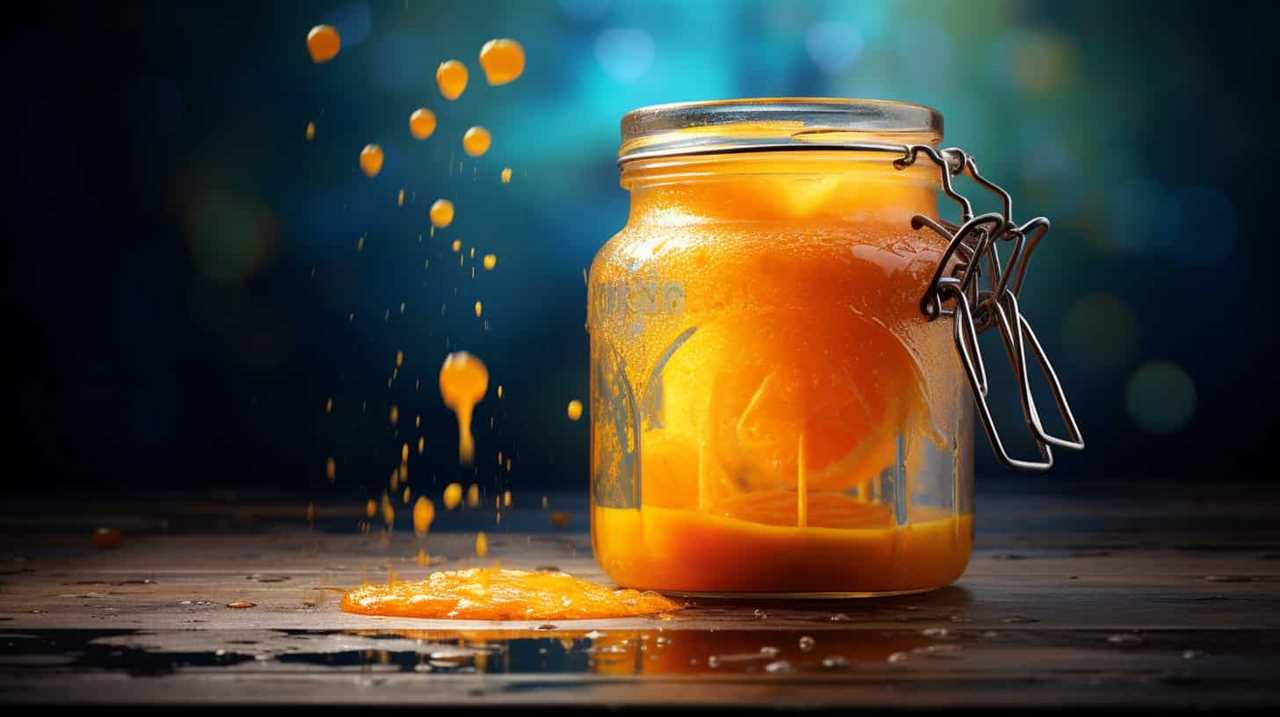
Can I Mix Fruits With Vegetables to Make a More Flavorful Juice?
Yes, you can mix fruits with vegetables to create a more flavorful juice. By experimenting with different combinations, you can craft unique and tasty vegetable juices that are not only delicious but also packed with nutrients.
Conclusion
So why not start crafting your own vegetable juices today?
By incorporating these nutritious drinks into your daily routine, you can experience a multitude of health benefits.
From boosting your immunity and aiding in weight loss to enhancing your energy and vitality.
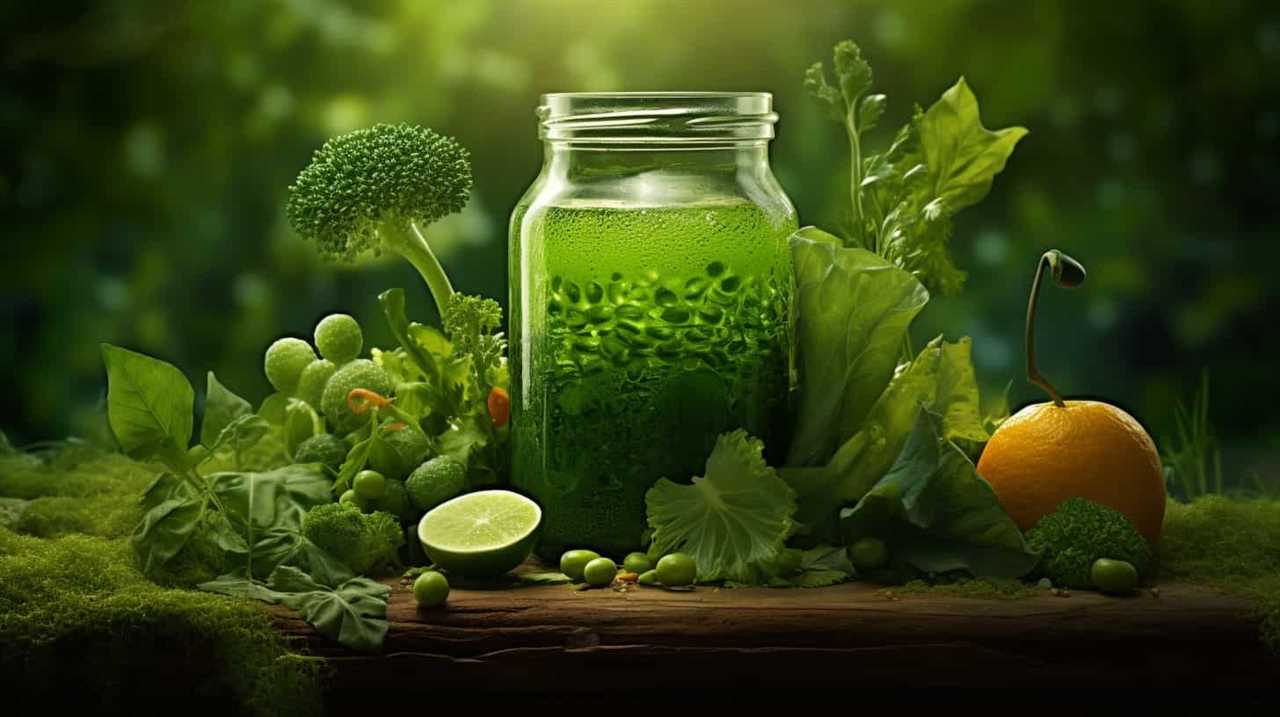
Imagine the vibrant colors and refreshing flavors of freshly squeezed vegetable juices, nourishing your body from the inside out.
Take control of your health and embark on this delicious and practical journey towards a vibrant and revitalized life.
Susannah expertise lies in researching and compiling evidence-based content on juicing, nutrition, and overall health. She is committed to ensuring that The Juicery World offers accurate, up-to-date, and trustworthy information to empower readers to take control of their health. Susannah’s goal is to inspire individuals to embrace juicing as a way to nourish their bodies and live their best lives.
-

 Juice Tips and Tricks3 weeks ago
Juice Tips and Tricks3 weeks agoHow To Make Homemade Pickle Juice
-

 Health Benefits of Juice1 month ago
Health Benefits of Juice1 month agoHow Much Bottled Lemon Juice Equals 1 Lemon
-

 Juice Tips and Tricks1 week ago
Juice Tips and Tricks1 week agoHow Much Lemon Juice Is Equal To Half A Lemon
-

 Juice Tips and Tricks2 weeks ago
Juice Tips and Tricks2 weeks agoHow Much Lemon Juice Concentrate Equals One Lemon
-

 Popular Juice Brands3 months ago
Popular Juice Brands3 months ago10 Top-Rated Organic Juice Brands to Try
-

 Popular Juice Brands3 months ago
Popular Juice Brands3 months ago9 Best No-Sugar-Added Popular Juice Brands
-

 Juice Tips and Tricks2 days ago
Juice Tips and Tricks2 days agoHow Long Can You Drink Orange Juice After The Expiration Date
-

 Juice Tips and Tricks1 month ago
Juice Tips and Tricks1 month agoHow Long Does Lemon Juice Last After Expiration Date










